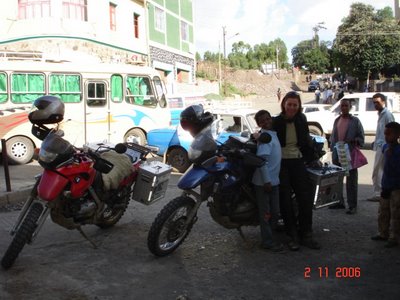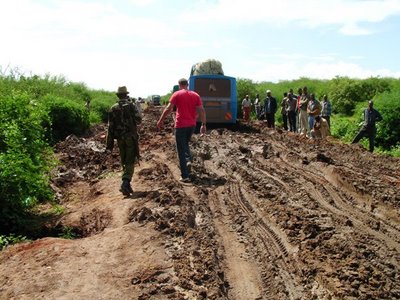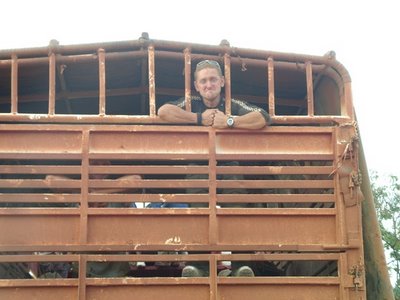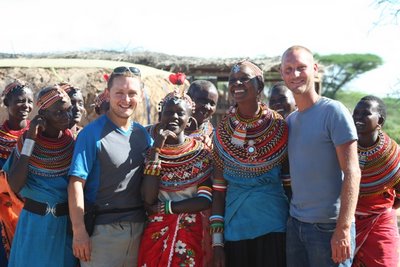Crossing the Equator
9 November: Ethiopia – Addis and then heading south via Lake Langano, Yabello and Moyale
Addis wasn’t a very exciting city. Actually, I found it a little bit frustrating because it felt like we were wasting time there. Everything was so slow – especially the internet that was jokingly called the World Wide Wait. Martin and Rickard found the best solution to this painful waiting was to drink beer at the meantime. They had a brilliant six hour session on the internet in which they emailed all their friends and relatives. Later at night I found Rickard in the lobby slurring to his grandmother over the phone – they definitely had a great night.
Possibly the only thing Addis had that was of interest to me personally was the skeleton of Lucy which is a small little woman that kind of fills the archaeological gap between apes and humans. I learnt about this back in Archaeology I at the University of Cape Town a long time ago but it was good to see the famous little bones.
The museum takes their security really seriously. The woman guard squeezed my backpack and then before I had time to react squeezed both my boobs and gave my crouch a grab. Fortunately this was all rather quick as it was shocking and they were armed. As I walked off I said to the boys, “What the heck was that all about!” They were disappointed they didn’t get the same treatment - and I’m still shocked.
We’d realised that pretty much nothing would be organised in Addis and had a bit of time to kill so we walked to the Hilton Hotel that is reputed to be The Bar to hang out in. We’d met a Canadian couple in Lalibela who lived in the Hilton – lucky buggers! And lucky for us Gordon (who happens to be a pilot) was in. He and a pilot friend came down to join us for a rather jovial, beer drinking and pizza session. It was a great break from all the cultural challenges we face while travelling. We could have been hanging out in Sandton or London. This made me realise that if you have money, travel can be really easy. It could be so easy but then there would be almost no point in actually leaving the comfort of your home country.
The roads south of Addis are excellent and by this I mean tarmac with fewer potholes. The traffic was not bad either – but the dopey animals and people still were the most dangerous obstacles. By late afternoon we had reached Lake Langano and followed a dodgy little dirt road to an exceptionally pretty campsite that was clearly freshly built and teeming with bird life.
The lakes are famous for their birdlife. I have never seen so many beautiful and interesting birds as I did in Ethiopia. This country is surely a bird-lover’s paradise. In the morning I was woken up by a flock of very noisy black and white birds that have nests that look like untidy weaver nests. The little birds were unafraid and hopped about our breakfast table picking up any crumbs they could find. I enjoyed the way they twittered and puffed out their feathers and hopped about our feet. There were also shy metallic blue and purple birds that wanted to snatch crumbs but were too chicken. We had a pair of orange billed hornbills inspect the car. And there were swallows swooping over the water. Well, I don’t know anything about birds but it was incredible.
Later that day, the Good Lord who looks over me presented a bona fide bike mechanic shop and I was able to have the frame bolted back together again and face Northern Kenya with renewed confidence.
In the evening we reached Yabello Sanctuary and stayed in a field with cattle and goats behind the motel that appeared to host Western tour groups. Most of the time, we find that camping in a hotel’s grounds is preferable to sleeping in the rooms. Paul and I get to stay in mozzie infested rooms more often but the Swedes have a tent on top of their car. They really have the best solution: all they need is to park up in a parking area, pay for a room and then use the toilets and frequent the bar. At the Yabello Motel a smart waiter came out to the field to take our orders for dinner and breakfast. It was a bit early and a bit strange but we don’t question these things any more.
In the morning while we were packing up the tent I noticed a goat being lead by two men, one armed with a large knife. I also noticed vultures circling in the sky and landing nearby. While Paul was watching the vultures I witnessed the goat having its throat cut and slowly die with its legs kicking and horrible noises as the air-pipe drew in air and spluttered out blood. I thought this would really gross me out. I don’t like eating meat and have been partly vegetarian most of my life – not because I feel bad about killing animals but rather because I don’t like the taste or texture of meat. When Paul realised what was happening he grimaced with disgust and said, “They are supposed to kill the animal quickly without suffering.”
I didn’t say anything because it didn’t seem appropriate but thought, “Maybe in England that is the case but here the animal is supposed to bleed out with its jugular cut – just like it did.” We can’t take our ideals with us and expect them to be implemented wherever we are just for our comfort and ease of mind. I smiled at Paul and said, “Hey, good thing you didn’t order breakfast then!”
I watched the rest of the skinning and cutting up of the animal. Every little bit had been used up and was probably the exact amount needed to feed the guests in the motel. The vultures and dogs then came to look for any little bits that may be cast aside. Absolutely nothing was left.
When we arrived in Moyale in the afternoon, after the visit to the Immigration Office and Customs, we booked into a cheap hotel (inappropriately called the Tourist Hotel as it was not tourist orientated at all) so that we could cross to Kenya early in the morning. There were two cute little goats head-butting each other. I joked with Paul, “Hey, look at the cute goats but don’t get too attached because they’ll be dinner.”
Paul looked and agreed, “You are probably right.” But he was not amused.
Later in the evening the goats were gone and I poked my head into the kitchen. It was a small room off the back of the room that has a couple of doggy pool tables. It was a scene right out of Natural Born Killers. There were bits of meat hanging off the chairs and pilled up on the table. It seemed that the whole room had a red spray effect and there was a cute little ginger kitten that looked very happy, well fed and as bloody as the rest of the room. A very big lady asked me if I wanted “tibbs” which is a local dish of fried meat with garlic and onion. I declined but sent Paul over to see what was on the menu. He came back with a face of disapproval. Rickard then went over, took a look at the kitchen and ordered a serving. When it arrived, both the guys at the meat and admitted it tasted good. On the upside, it was fresh!
During my visit to Ethiopia I’d met two really likeable boys, Daniel and Dude. Daniel lives in Moyale and attached himself to Rickard. We are so used to all kinds of touts hassling us, trying to help and then asking for a tip or fee but this teenage boy was just special (and a serious football fan). He said he was the brightest kid in his school and we could tell he must be. We spent the evening with him and had a really great time. When we left we gave him our leftover Ethiopian small change (I wanted to promise to help him get to university but know to be realistic). The other little fella was Dude in Gondar and he stole my heart. He was probably ten or eleven years old and even though scruffy, had a trendy look. I liked his cool way of talking and frankness. When we got back from the Simian Mountains he asked Rickard how it was and when Rickard said it was cold Dude replied, “I told you so.” followed by “I said you should borrow my jersey.”
I still think of his broad toothy smile and how when we said goodbye he told me to ride safe and watch out for the crazy donkeys.

What we hadn’t realised about Ethiopia is the extent that people and animals eat a leaf called “chat” and get themselves completely stoned. I couldn’t understand why the whole country was on a huge go-slow and almost everyone and every beast seemed dopey. We eventually realised that all the little leafy twigs that people carry about are actually chat leaves to get high on (not to swat flies with). It’s a tree that grows in abundance and the animals are just as addicted - this is why nothing gets out of the road to avoid certain death.
Looking back these are my favourite things about Ethiopia:
13 November: Kenya – Cross border at Moyale. Tough truck ride to Marsabit, then Isiolo, Mount Kenya and Nairobi
While Ethiopia was on chat I was on anti malarial tablets. The package warns that people with a history of mental illness might react badly and that side effects include attempted suicide and depression. And even though I fall into the above mentioned category, I risked taking them all the same. By the time I was travelling through Ethiopia I had to really fight with myself. During bad patches it’s a battle to make my intelligent mind override how I feel. I feel like an empty vessel and that my soul has departed but I can still figure out what I need to do to maintain a perception of normality. All the same, in Addis I was very nearly ready to just say, “Stuff this. I’m going to stop now.” I’d lost the will to travel, to see Africa, to meet people… to get out of bed. Fortunately since stopping with the tablets I’m better now. The trip will continue and I am having a fantastic time again.
Luckily, as a result of no longer feeling deeply depressed, I was on a bit of a high when I did the road from Moyale to Marsabit. This was the last stretch of really bad, unavoidable road. It’s not only a bad road but it’s also in bandit territory and so the prospect of being stuck in the mud is not a good one. It’s really hard to guess how bad things really are but we’d been advised to either drive with a convoy or take police escorts. Rainy season had set in already and we’d already seen the kind of daily downpours that were turning the dirt road to a deep, muddy, rutted mess.
Moyale on the Kenya side is a very unpleasant town and renown for its thieves and con-artists. While we tried to find out information about the road – if it was passable, etc a huge crowd gathered around us and it became very stressful. Eventually we went with the most conservative option: we put the bikes on the back of a truck and we had two policemen – one to travel with the boys and one with us in the truck. It was a journey from hell and one that Paul will probably never forgive me for (as he wanted to ride and take risks while I was worried we’d be slow and make ourselves a target for the bandits). The truck driver (or who knows who) wasted so much time and we felt like they were messing us about. They would either be driving flat out at a silly speed or stopping and there would be lots of yelling and people jumping on or off. All the time we were in the back unable to see out except through small gaps with the bikes tied up precariously and boxes and goods bouncing about violently. Ironically, I was having a great day (I blame the lack of drugs). Certainly, it’s a day that I’ll remember for the rest of my life.

We were not even half way and it was afternoon already. The news was that there was a section of road that had a lot of trucks stuck on it and that made it impossible to pass. Martin and I (with our policeman) went ahead in the Landrover to see just how serious the problem was and if it there was any chance of taking the bikes off and giving it a bash. It was pretty bad… Eventually the trucks moved and even later our truck arrived with Paul and Rickard, severely bounced about and dirty. The short version of the story is that it was nightfall when we reached Turbi (about half way to Marsabit) and after long arguments we decided to stay on the truck rather than camp there. We reached Marsabit by 11pm. Rickard and Paul were bruised, bashed and traumatised from the truck ride in the pitch dark, Martin was shattered from driving his car at night at one heck of a speed to keep up with the truck – and I felt really bad because I was a terrified passenger and unable to do a thing. To make things much worse, Paul’s bike had broken loose in the truck, got smashed about and wouldn’t start. We didn’t know how bad the damage was.

I’d like to say that in the morning things looked better but Paul was like a beast from hell. He got his bike starting again which is impressive as he had a lot of dust in his ignition switch and had to basically short circuit the wires. He didn’t rip out anybody’s jugular which relieved us a tremendously as we were all keeping a good distance and hoping the crowd of nosey bodies would be a barrier if he snapped and attacked someone.
We then faced the last 250km of bad roads, possibly the last for the rest of the whole trip. Once we’d reached Isiolo there would be a tarmac option all the way to Cape Town. I’m pleased to say that Paul can no longer call me slow or give me condescending attitude about doing tough roads. I really CAN do it.
A party mood set in when we found a campsite at Archer’s Post near the Samburu National Park. We set up camp and then celebrated with red wine and beers. We were supposed to have a braai (barbeque) but the meat was utterly pathetic and didn’t even qualify as dog food… We moaned about it and had bread for dinner but who cares! We’d broken the back of the trip and as Martin pointed out, “Now the vacation begins.”

While riding I’d seen these incredibly tall, elegant people dressed in a red cloth, casually holding a spear and moving in a very graceful way. The thing that struck me was firstly was how attractive they were and then also how well dressed and proud they looked. Both the men and the women were impeccably dressed in bright cloth with decorative beads. I really did think that these people were gorgeous.
The campsite we stayed in is run by Samburu. They put on a dance in the evening and it’s possible to visit the village and buy hand crafted beadwork. For a bit of background, the Samburu are very similar to the well-known Masai, especially in clothing but their language differs slightly. There are various songs and dances that include the men jumping and women making a wave-like motion with their shoulders. Quite obviously it all costs quite a bit which sparked off a debate on the relationship between culture and tourism. I think the boozy conclusion was more or less that tourists pay to see the Samburu village and way of life and that has become an income that is preserving their culture. So we agreed to pay and they entertained us. I did notice that the girls really did put on a performance for us (and were not as pleased to see us as we were to see them) as the moment the camera was turned away the smiles were replaced with dead-pan faces.

Rain, rain and more rain. We reached Mount Kenya and couldn’t see much because of the thick rain and clouds. However, we did see an elephant. At about 2am I woke up because I heard a rather loud tummy grumble followed by some snapping branches. Fortunately we’d already seen the elephant earlier, that saved me from a heart attack on the spot as I pulled the curtain aside and the entire window was one big elephant arse. I woke Paul up who then in his dozy state tried to find his camera. In the morning the elephant was still hanging about, walking around the hotel garden as if it was his part of the jungle, casually munching anything and walking through the wooden fences. He got on with his elephant business but kept one eye on us and if we were too close he turned to face us and flapped his ears. Predictably, we all retreated.
The real tough bit of the trip ended as we arrived in Nairobi. We were glad to be there but it also felt like the best bit of the adventure was over. We all collapsed in a state of fatigue. For a few days all we have done is eat and sleep and sit about chatting. To my surprise I met a guy that looked exactly like a guy I met in the UK nearly two years ago – and then I realised that it was the same guy! Mike and John have made it from Alaska to South America and from Cape Town to Nairobi (see www.exploringrtw.com).
On the touristy side of things we went to visit Karen Blixen’s house. I remember being about fourteen and very impressionable when I watched a badly scratched video of Out of Africa. I’ve watched the film a few times subsequently and am always swept away by Meryl Streep’s portrayal of Karen. I can hear her voice saying, “I had a farm in Africa.” and I remember how much I longed to be a brave, adventurous woman like her. Her life was full of hardship as well as disappointment and loneliness but she was so passionate and compassionate. I realise now how much she was loved and what a great impression she made on her community. It was emotional walking around her house, looking at the Ngong Hills and the school she started. I felt inspired all over again and my heart was if full of love for Africa.
For a bit of fun we went to the giraffe centre where I was able to feed some giraffes by hand. Usually wild animals are so wild we only get to see them from a distance and fear them so having a funny faced giraffe eat out of my hand was FUN.
The bikes are nearly up and running again and we still have some things to sort out before we will head towards Uganda and the Stand Up For Africa charity SAFU in Kampala.


<< Home